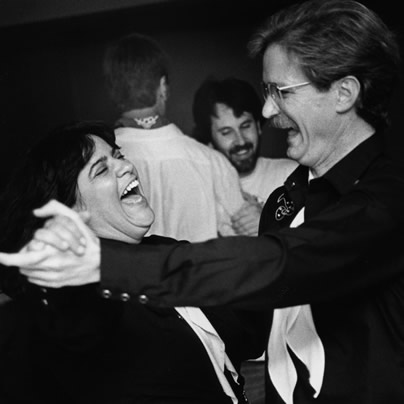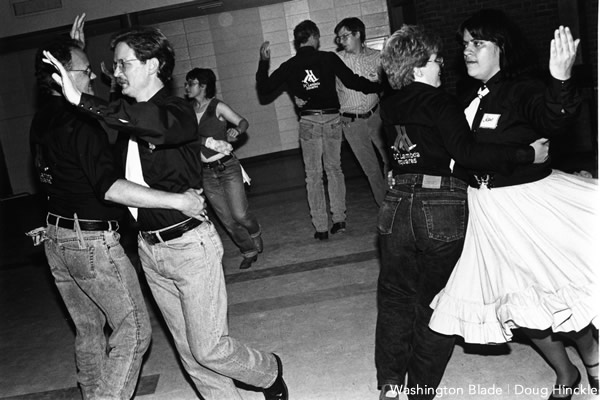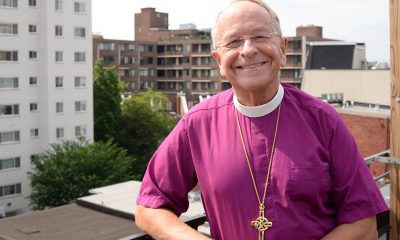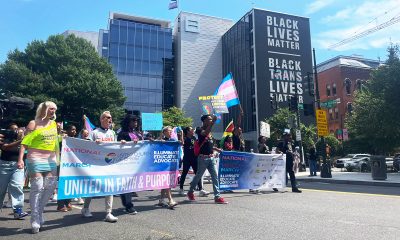Arts & Entertainment
‘You’re so Square, Baby I Don’t Care’
D.C. Lambda Squares celebrating 30th anniversary this weekend

On any given Thursday night, a group of about 65 people from the LGBT community gather in the music suite of National City Christian Church to square dance with their friends.
But don’t expect to see cowboy hats, prairie skirts or couples doing the “Dosey Doe.” These square dancers dress casually, have no couple requirements, allow all-positioning dancing and the caller is using a Lady Gaga song.
One thing’s for sure: This is not your grandparents’ square dancing.
Since 1982, the D.C. Lambda Squares have been bringing a level of excitement and energy to the dance floor that was once unheard of in the square dance community.
“It was founded by a group of gay men and lesbians who wanted to square dance but at the time, straight clubs were non-accepting of same-sex couples square dancing, or people dancing other than in their traditional position,” says Joe Harr, president of the D.C. Lambda Squares. “They formed this club so they could dance the way they wanted to.”
Today, the club is open to young and old, singles or couples and beginners or advanced dancers. Anyone interested can visit the group online.
“My favorite part is the people involved are very welcoming and open and it’s just a relaxed atmosphere,” Harr says. “There are various gay square dance clubs throughout the U.S., and an international association and many people take part in other weekend dances.”
In addition to D.C. Lambda Squares’ regular Thursday-night get-together, which meets from 7:30 to 9:30 p.m. in D.C. at National City Christian Church (5 Thomas Circle, NW), eight times a year, the club holds a community dance at Francis Scott Key Middle School (910 Schindler Dr.) in Silver Spring, Md.
In honor of the organization’s 30th anniversary, the Lambda Squares are holding a party Saturday at Francis Scott Key Middle School with Doren McBroom set to call.
“A 30th anniversary is the pearl anniversary, so we are telling everyone to wear pearls for this event,” Harr says. “Our last community dance was a beach theme so people came in their bathing suits. We expect everyone to have a great time.”
Other regular callers are Dayle Hodge and club members Kent Forester and Brian Jarvis.
John Burlison, a former club president who has been a member since 2000, has watched the club’s membership ebb and flow over the last dozen years and is happy that interest is on the upswing.
“The people I learned with was the largest class for many years but we went through a time when it was very difficult to find new members,” Burlison says. “That appears to be slowly changing, as in recent years people have rediscovered square dancing as a fun activity and a great way to meet people.”
Membership coordinator Joe Branch learned of the group from seeing them perform at a Pride festival three years ago and has helped spearhead bringing the group to other events around the area, such as Gay Day at the Hillwood Museum this past year.
“What we try to do is perform at Pride and try to find other venues to do demos, hold open houses and try to perform at different community events to get people interested in square dancing,” Branch says. “Square dancing is a delightful activity full of wonderful people. I think the D.C. Lambda Squares is the friendliest group of people I have ever met.”
Many of the members have been with the group for at least 10 years, and this is designated with a special bar that they put on their membership badge. This past year, the group had to order some 20-year bars to commemorate those that have been involved since the early ’90s.
“Those who were here at the beginning did wear traditional western wear, and that has been the biggest change, since we wear what we are comfortable in,” Harr says. “For us, it’s not about living up to a certain square dancing cliché, we are all about having fun.”
Cindy Scharf has been going to Lambda Squares since 1997, learning about the group from a friend.
“I got involved initially to get some exercise and to meet some women in the LGBT community, and I ended up meeting a lot of good friends,” she says. “After a hard day of work, to come in and see so many smiling faces is really uplifting.”
Not only did Scharf make lots of new friends, but her going had a monumental impact on her life.
“I met my wife Olivia there,” she says. “It’s an organization that is open to singles and you don’t need a partner to dance. People are willing to dance with you. It’s not partnered up in the way the straight dancing is. A lot of people have met the people they are with through square dancing.”
One of her favorite things about the club is that the music isn’t what you would normally think of when you hear the term “square dancing.” That’s another of the positive changes through the years.
“I think there is a misconception that people who square dance tend to dance only to country-western music,” she says, “but the callers have a variety of music from different genres and some relatively modern things.”
Scharf and her wife also use their involvement in square dancing to help them decide on vacations.
“One of the things that we both enjoy about it is that we travel around a lot,” she says. “Every year there’s an annual convention and we use that as an excuse to travel to different places that we might not otherwise had in our sights to go to.”
Both Scharf and Burlison have fond memories of the 20th anniversary party and are looking forward to the fun night that the 30th promises, as well.
“We’re expecting to have some old friends and members who haven’t been here for a while come out for the night,” Harr says. “Remember, before the Internet, people had to actually go out of their houses to meet people and have fun. Square dancing is a great thing for people who love to dance to blow off steam, interact with other members and visit with their friends.”
Photos
PHOTOS: Montgomery County Pride in the Plaza
LGBTQ celebration held in downtown Silver Spring

Montgomery County Pride in the Plaza was held on Sunday, June 29 at Veterans Plaza in Silver Spring, Md.
(Washington Blade photos by Michael Key)























The fifth annual Fredericksburg Pride march and festival was held on Saturday, June 28. A march through the streets of downtown Fredericksburg, Va. was followed by a festival at Riverfront Park.
(Washington Blade photos by Michael Key)



















India
Anaya Bangar challenges ban on trans women in female cricket teams
Former Indian cricketer Sanjay Bangar’s daughter has received support

Anaya Bangar, the daughter of former Indian cricketer Sanjay Bangar, has partnered with the Manchester Metropolitan University Institute of Sport in the U.K. to assess her physiological profile following her gender-affirming surgery and undergoing hormone replacement therapy.
From January to March 2025, the 23-year-old underwent an eight-week research project that measured her glucose levels, oxygen uptake, muscle mass, strength, and endurance after extensive training.
The results, shared via Instagram, revealed her metrics align with those of cisgender female athletes, positioning her as eligible for women’s cricket under current scientific standards. Bangar’s findings challenge the International Cricket Council’s 2023 ban on transgender athletes in women’s cricket, prompting her to call for a science-based dialogue with the Board of Control for Cricket in India and the ICC to reform policies for transgender inclusion.
“I am talking with scientific evidence in my hand,” Bangar said in an interview posted to her Instagram page. “So, I hope, this makes an impact and I will be hoping to BCCI and ICC talking with me and discussing this further.”
On Nov. 21, 2023, the ICC enacted a controversial policy barring trans women from international women’s cricket. Finalized after a board meeting in Ahmedabad, India, the regulation prohibits any trans player who has experienced male puberty from competing, irrespective of gender-affirming surgery or hormone therapy. Developed through a 9-month consultation led by the ICC’s Medical Advisory Committee, the rule aims to safeguard the “integrity, safety, and fairness” of women’s cricket but has drawn criticism for excluding athletes like Canada’s Danielle McGahey, the first trans woman to play internationally. The policy, which allows domestic boards to set their own rules, is slated for review by November 2025.
Bangar shared a document on social media verifying her participation in a physiological study at the Manchester Metropolitan University Institute of Sport, conducted from Jan. 20 to March 3, 2025, focused on cricket performance. The report confirmed that her vital metrics — including haemoglobin, blood glucose, peak power, and mean power — aligned with those of cisgender female athletes. Initially, her fasting blood glucose measured 6.1 mmol/L, slightly above the typical non-diabetic range of 4.0–5.9 mmol/L, but subsequent tests showed it normalized, reinforcing the study’s findings that her physical profile meets female athletic standards.
“I am submitting this to the BCCI and ICC, with full transparency and hope,” said Bangar. “My only intention is to start a conversation based on facts not fear. To build space, not divide it.”
In a letter to the BCCI and the ICC, Bangar emphasized her test results from the Manchester Metropolitan University study. She explained that the research aimed to assess how hormone therapy had influenced her strength, stamina, haemoglobin, glucose levels, and overall performance, benchmarked directly against cisgender female athletic standards.
Bangar’s letter to the BCCI and the ICC clarified the Manchester study was not intended as a political statement but as a catalyst for a science-driven dialogue on fairness and inclusion in cricket. She emphasized the importance of prioritizing empirical data over assumptions to shape equitable policies for trans athletes in the sport.
Bangar urged the BCCI, the world’s most influential cricket authority, to initiate a formal dialogue on trans women’s inclusion in women’s cricket, rooted in medical science, performance metrics, and ethical fairness. She called for the exploration of eligibility pathways based on sport-specific criteria, such as haemoglobin thresholds, testosterone suppression timelines, and standardized performance testing. Additionally, she advocated for collaboration with experts, athletes, and legal advisors to develop policies that balance inclusivity with competitive integrity.
“I am releasing my report and story publicly not for sympathy, but for truth. Because inclusion does not mean ignoring fairness, it means measuring it, transparently and responsibly,” said Bangar in a letter to the BCCI. “I would deeply appreciate the opportunity to meet with you or a representative of the BCCI or ICC to present my findings, discuss possible policy pathways, and work towards a future where every athlete is evaluated based on real data, not outdated perceptions.”
Before her transition, Bangar competed for Islam Gymkhana in Mumbai and Hinckley Cricket Club in the U.K., showcasing her talent in domestic cricket circuits. Her father, Sanjay Bangar, was a dependable all-rounder for the Indian national cricket team from 2001 to 2004, playing 12 test matches and 15 One Day Internationals. He later served as a batting coach for the Indian team from 2014 to 2019, contributing to its strategic development.
Cricket in India is a cultural phenomenon, commanding a fanbase of more than 1 billion, with more than 80 percent of global cricket viewership originating from the country.
The International Cricket Council, the sport’s governing body, oversees 12 full member nations and more than 90 associate members, with the U.S. recently gaining associate member status in 2019 and co-hosting the 2024 ICC Men’s T20 World Cup. The BCCI generated approximately $2.25 billion in revenue in the 2023–24 financial year, primarily from the Indian Premier League, bilateral series, and ICC revenue sharing. The ICC earns over $3 billion from media rights in India alone for the 2024–27 cycle, contributing nearly 90 percent of its global media rights revenue, with the BCCI receiving 38.5 percent of the ICC’s annual earnings, approximately $231 million per year.
Women’s cricket in India enjoys a growing fanbase, with over 300 million viewers for the Women’s Premier League in 2024, making it a significant driver of the sport’s global popularity. The International Cricket Council oversees women’s cricket in 12 full member nations and over 90 associate members, with the U.S. fielding a women’s team since gaining associate status in 2019 and competing in ICC events like the 2024 Women’s T20 World Cup qualifiers. The BCCI invests heavily in women’s cricket, allocating approximately $60 million annually to the WPL and domestic programs in 2024–25, while contributing to the ICC’s $20 million budget for women’s cricket development globally. India’s media market for women’s cricket, including WPL broadcasting rights, generated $120 million in 2024, accounting for over 50 percent of the ICC’s women’s cricket media revenue.
“As a woman, I feel when someone says that they are women, then they are, be trans or cis. A trans woman is definitely the same as a cis woman emotionally and in vitals, and specially, when someone is on hormone replacement therapy. Stopping Anaya Bangar from playing is discrimination and violation of her rights. It is really sad and painful that every transwoman need to fight and prove their identity everywhere,” said Indrani Chakraborty, an LGBTQ rights activist and a mother of a trans woman. “If ICC and BCCI is stopping her from playing for being transgender, then I will say this to be their lack of awareness and of course the social mindsets which deny acceptance.”
Chakraborty told the Blade that Bangar is an asset, no matter what. She said that the women’s cricket team will only benefit by participation, but the discriminating policies are the hindrance.
“Actually the transgender community face such discrimination in every sphere. In spite of being potent, they face rejection. This is highly inhuman. These attitudes is regressive and will never let to prosper. Are we really in 2025?,” said Chakraborty. “We, our mindset and the society are the issues. We, as a whole, need to get aware and have to come together for getting justice for Anaya. If today, we remain silent, the entire community will be oppressed. Proper knowledge of gender issues need to be understood.”
The BCCI and the International Cricket Council have not responded to the Blade’s repeated requests for comment.
-

 U.S. Supreme Court5 days ago
U.S. Supreme Court5 days agoSupreme Court upholds ACA rule that makes PrEP, other preventative care free
-

 U.S. Supreme Court5 days ago
U.S. Supreme Court5 days agoSupreme Court rules parents must have option to opt children out of LGBTQ-specific lessons
-

 Television5 days ago
Television5 days ago‘White Lotus,’ ‘Severance,’ ‘Andor’ lead Dorian TV Awards noms
-

 Music & Concerts5 days ago
Music & Concerts5 days agoBerkshire Choral to commemorate Matthew Shepard’s life













